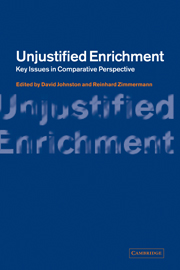Book contents
- Frontmatter
- Contents
- List of contributors
- Preface
- Table of cases
- List of abbreviations
- I Introduction
- II Enrichment ‘without legal ground’ or unjust factor approach
- III Failure of consideration
- IV Duress and fraud
- V Change of position
- VI Illegality
- VII Encroachment and restitution for wrongs
- VIII Improvements
- IX Discharge of another person's debt
- 16 Performance of another's obligation: French and English law contrasted
- 17 Payment of another's debt
- X Third-party enrichment
- XI Proprietary issues
- XII Taxonomy
- Index
17 - Payment of another's debt
Published online by Cambridge University Press: 31 July 2009
- Frontmatter
- Contents
- List of contributors
- Preface
- Table of cases
- List of abbreviations
- I Introduction
- II Enrichment ‘without legal ground’ or unjust factor approach
- III Failure of consideration
- IV Duress and fraud
- V Change of position
- VI Illegality
- VII Encroachment and restitution for wrongs
- VIII Improvements
- IX Discharge of another person's debt
- 16 Performance of another's obligation: French and English law contrasted
- 17 Payment of another's debt
- X Third-party enrichment
- XI Proprietary issues
- XII Taxonomy
- Index
Summary
The problem
A parent picks up the unpaid bills of her student child at the end of the university term. A football club pays off the gambling and other debts incurred by one of its star players. In my absence from home at an enrichment conference, my neighbour in my Edinburgh tenement flat pays my share of the bill for work carried out in the tenement garden, the underlying contract with the gardener providing that each resident is to be liable only for a pro-rata share. At least two potential enrichment questions arise. If the creditors take no further action against the student or the footballer or me, we three debtors will benefit by the savings made through not having to pay our debts. The creditors will be enriched, however, if, despite the interventions of the parent, the club and the good neighbour, they also continue to seek and recover payment from, respectively, the student or the footballer or me. In both situations, the gain is made at the expense of the payer. Can the respective payers recover either their own expenses or the debtors' enrichments?
Terminology
In the rest of this account the following terminology will be used: the person who pays another's debt will be called the payer (P); the recipient of the payment will be termed the creditor (C); and the person whose debt is paid by P will be known as the debtor (D).
- Type
- Chapter
- Information
- Unjustified EnrichmentKey Issues in Comparative Perspective, pp. 458 - 490Publisher: Cambridge University PressPrint publication year: 2002



